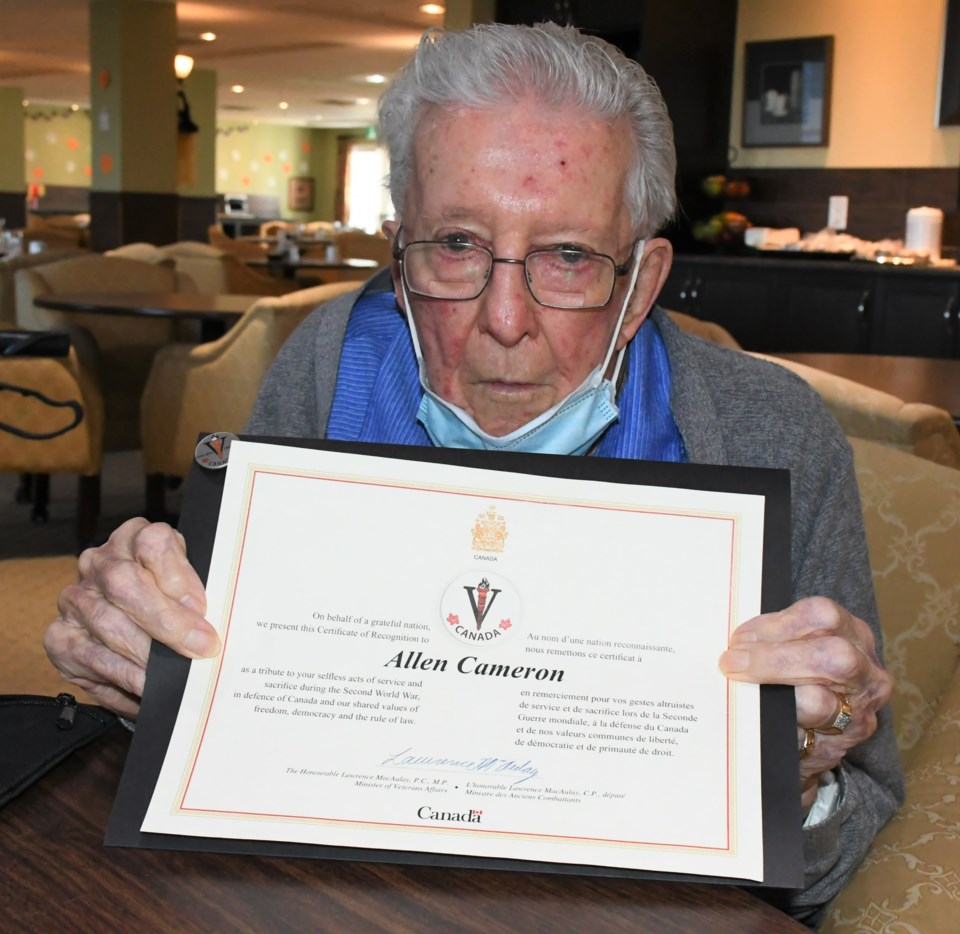Second World War veteran Allen (Al) Cameron believes the federal government has honoured him with two awards because of an incident in which he was involved while stationed in Italy.
The Department of Veterans Affairs sent Cameron a certificate of recognition and commemorative lapel pin in late October as part of its efforts to thank all servicemen who served during the war.
“I was quite surprised to receive this,” Cameron said recently.
Lawrence MacAuley, minister of Veterans Affairs, explained in a letter that, from 2014 to 2020, the federal government marked the 75th anniversary of major milestones that occurred during the Second World War.
“Canadians, like you, selflessly rallied together in extraordinary ways to defend the right of all people to live in peace and freedom. It is thanks to your brave and courageous service that the struggle against tyranny and oppression was won,” said MacAuley. “As we mark the 75th anniversary of the end of the Second World War, please know that Canada will never forget your valiant service and dedication to our great country.”
The pin Cameron received has the “V for victory” symbol and the dates of 1939-45 and 2014-2020. The certificate, meanwhile, thanks the veteran for his “selfless acts of service and sacrifice during the Second World War, in defence of Canada and our shared values of freedom, democracy and rule of law.”
Receiving the two commemorative items allowed Cameron to jump back 77 years to reflect on what he had done to earn this recognition.
In 1944, Cameron, then 18, was an airframe maintenance technician with the Royal Canadian Air Force (RCAF). He was stationed 16 kilometres south of the town of Rimini on the east coast of central Italy, where he was responsible for maintaining the legendary Spitfire fighter planes.
Cameron recalled that one day, a small Piper J-3 Cub light aircraft landed on a nearby runway and out popped an army colonel with one crewman. The officer wanted to fly north to study the front lines in preparation for an upcoming battle.
“The reason he had the crewman was because the aircraft had to be started by hand on the propellor. And his crewman was not feeling well at all, so he wanted to know if his crewman could stay there while he went and did a survey of the lines near and be close to where the action was,” said Cameron.
“So, he (asked if) there was anybody who knows how to start this aircraft by swinging the prop by hand. I was the only guy who could do it. I learned it here in Moose Jaw when I was taking my airframe training course.”
Cameron started the plane and then joined the colonel to survey the area. They repeated this same activity the next day. Afterward, the colonel and his crewman returned to base while Cameron — who thoroughly enjoyed taking part in the spy mission — returned to fixing Spitfires.
“… was I scared over there? You bet your boots I was. And so were the other guys,” he added. “When I flew in that Piper Cub twice, it didn’t bother me a bit. The war was on, and things had to be done.”
During the interview, Cameron recalled other memories that have stuck with him for nearly 80 years.
Besides the Germans, the Canadians also had to beware of Italian partisans operating behind the lines. They were a “rough group,” he said, which was unfortunate since they were supposed to be allies in the fight against the Germans.
Meanwhile, the Allies regularly sent out thousands of bombers to attack Germany throughout the war. Cameron and his mechanic colleagues watched dozens of bombers take off from base but were crestfallen to see only 10 to 15 planes ever return.
“That took some getting used to at 18,” he said.
Cameron plans to frame his certificate and hang it in the Army, Navy and Air Force Veterans (ANAVETS) building on High Street West. As the only veteran of his generation there, and one of a few remaining in Moose Jaw, he hopes other veterans realize the awards honour them as well.




